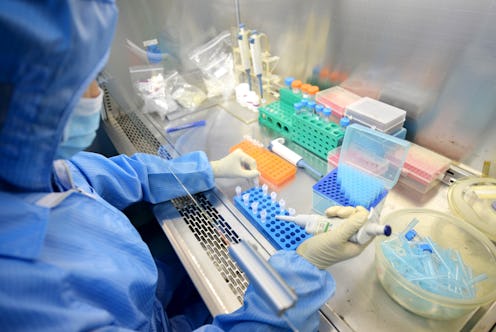News
Doc Gives Up Ebola Serum For His Colleague

In a move that reaffirms my faith in the good of humanity, Dr. Kent Brantly gave up a potentially life-saving Ebola serum for his colleague, also stricken by the deadly virus. Nancy Writebol, an aid worker with the joint team of Samaritan's Purse and SIM, became the first person in the African country to receive the serum, which researchers hope will serve as a solution to the devastating disease.
After asking that the treatment be given to his colleague, Dr. Brantly received another experimental treatment — a unit of blood from an Ebola survivor who Dr. Brantly cared for. In a statement, Franklin Graham, president of Samaritan's Purse wrote that the 14-year-old survivor "wanted to be able to help the doctor that saved his life."
As of Thursday's statement, both Writebol and Brantly were said to be in "stable but grave condition," though Brantly was said to take "a slight turn for the worse overnight."
The Ebola outbreak in Africa, which has now spread throughout Guinea, Sierra Leone, Nigeria and Liberia, is estimated to have affected upwards of 1300 people and has been deadly for at least 729 of them. This reflects a mortality rate of over 50 percent — a stunning statistic in what is generally thought to be a medically advanced world.
Unfortunately, Ebola remains a virus for which there is no known vaccine or treatment. While some individuals manage to ward off the disease naturally by producing antibodies, it is difficult to translate these antibodies into a cure.
Moreover, it has not been proven to be particularly effective, as Thomas Geisbert of the University of Texas Medical Branch explained to NBC News. "It is a very controversial topic if you are talking about the serum from a survivor," Geisbert said, noting that when his researchers attempted to use a survivor's antibodies to fight Ebola in monkeys, it did not work.
The number of variables and unknowns present in Ebola simply remain too high for scientists to find an effective cure, but there are a number of trial treatments in the pipeline.
One of these, no one is sure of which, was sent to Liberia on Wednesday and administered to Nancy Writebol. Both Writebol and Brantly will be returning to the United States — on Thursday, a jet outfitted with an isolation pod left American soil for Liberia to collect the two aid workers and bring them home.
It is not known when Writebol and Brantly will return, but when they do, it will mark the first time that confirmed Ebola patients will be present in the United States. According to CNN reports, one or both of them will be treated near the headquarters of the U.S. Centers for Disease Control and Prevention in Atlanta, Georgia.
Thus far, the virus has been contained in West African nations, though the disease spread quickly from Guinea — where the first case was reported in February — to neighboring Sierra Leone and then Liberia. Nigeria, which does not share borders with any of these three countries, has also reported one case.
Fears of the virus' spread may very well be legitimate, as patients may not notice the symptoms of the disease, which take up to three weeks to appear. With the ever-increasing global connectivity of the world, containing a disease is becoming more and more difficult.
It is still unknown how Brantly and Writebol contracted the disease to begin with — when Brantly discovered he had symptoms of the virus, he immediately quarantined himself, as all Ebola patients are required to do. Visiting and treating infected individuals requires full hazmat suits, and even when all necessary precautions are taken, there is still a danger of infection.
On Thursday, the CDC issued a Level 3 travel advisory for the three nations worst hit by Ebola, asking people to avoid any and all nonessential travel to the region. This is only the second time in more than a decade that the CDC has given such a warning — the last time was in response to the SARs outbreak in Asia in 2003. Many aid groups are also evacuating their workers, concerned that they will only add to the growing number of affected patients.
In response to growing concern over the prevalence of the Ebola threat, the National Institutes of Health declared that it would begin testing a vaccine against the virus in September. The vaccine has been in the works for "the last few years" and has proven effective on monkeys.
Hopefully, the experimental serum used on Writebol will also shed some light on a cure to the devastating virus, and will begin to alleviate the stress of the disease for those most desperately in need in West Africa.
Images: Getty (4)